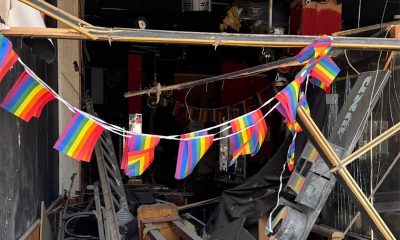Middle East
Brother of former Israeli hostage returns to D.C.
Gili Roman’s sister was held in Gaza Strip for 53 days
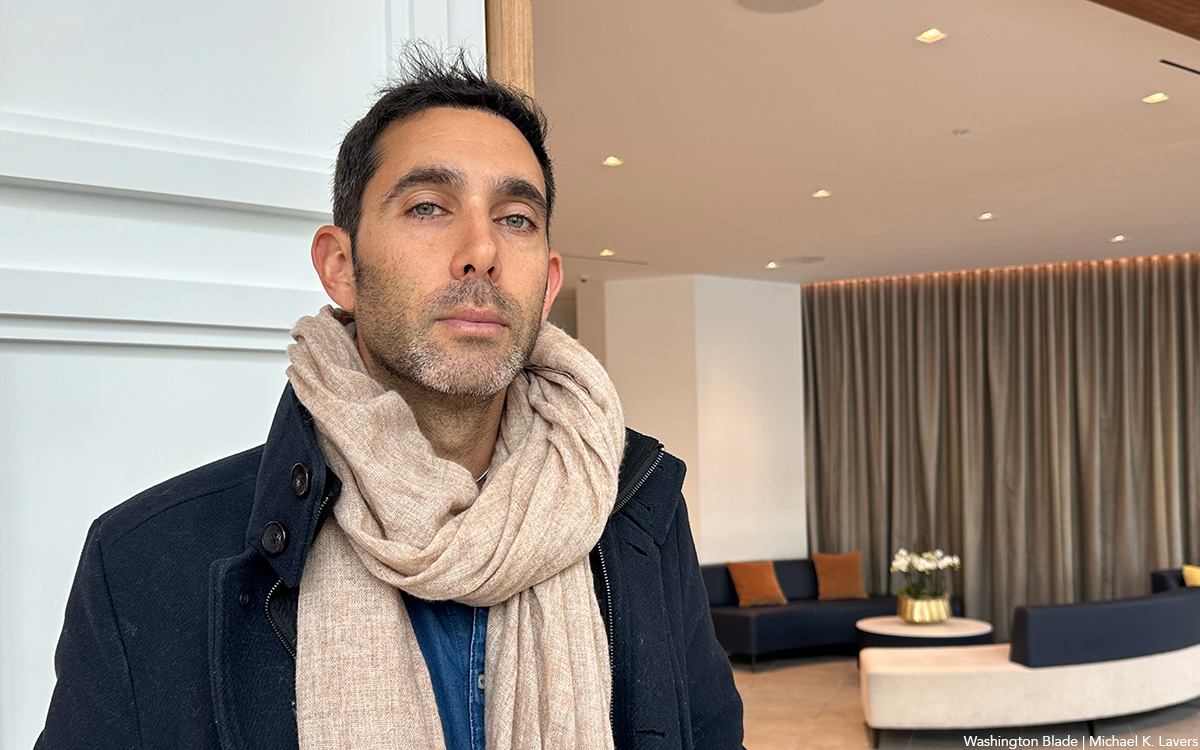
Yarden Roman-Gat, her husband, Alon Gat and their 3-year-old daughter, Geffen, were visiting her in-laws in Be’eri, a kibbutz that is near the border of Israel and the Gaza Strip, on Oct. 7, 2023.
Hamas shortly after 6 a.m. launched a surprise attack against communities in southern Israel from the Palestinian enclave it governs. Four militants placed Roman-Gat and her family into a car with two other Be’eri residents. They jumped out of it as it approached Gaza. Roman-Gat handed her daughter to her husband and they ran away.
The group the U.S. has designated a terrorist organization held Roman-Gat hostage in Gaza until her release on Nov. 29. Her brother, Gili Roman, a gay teacher and member of Israel’s Nemos LGBTQ+ Swimming Club who lives in Tel Aviv, returned to D.C. last week.
“She’s doing well,” Roman told the Washington Blade on Jan. 18 during an interview at a hotel near Union Station.
Roman-Gat spoke to “60 Minutes” less than a month after her release. Roman shared with the Blade details about his sister’s time in captivity.
He said she was alone, with three men guarding her.
“For 53 days she was observed and subjected to the will of three guys,” said Roman. “We are relieved because she was not abused, and we know that other people were abused and violently treated. This is not her case, but it was still a very traumatic experience.”
Militants on Oct. 7 killed her mother-in-law and kidnapped her sister-in-law, Carmel Gat, who remains in Gaza.
Roman said his sister learned militants had murdered her mother-in-law when she overheard “a very small” part of a song on Israeli radio that had been dedicated to her.
“This is how she found out that she had been murdered, that her sister-in-law is still a hostage,” Roman told the Blade. “Since they didn’t talk about her daughter and her husband, she concluded that they are alive.”
He said the men who held his sister hostage were members of Hamas and were religious. Roman told the Blade that some of them had university degrees and they explained to Roman-Gat why she had been kidnapped.
“She was a tool of war,” said Roman. “They told her many times it is not about Gaza and it’s not about Palestine. It’s not about the Palestinians.”
“The only reason that they’re keeping her is for the global fight for Islam, is a sort of global jihad,” he added. “Of course, they do not expect to get a Muslim empire, now. She’s just a tool in the long run ambition of them to have a Muslim empire around the world. This is pretty harsh, and they constantly told her that. This is the kind of extremism that she lived in and had to protect herself (from.)”
Roman said they also forced his sister to wear a hijab.
“She said it became her only shield,” he told the Blade.
Roman said his sister didn’t realize she was going to be released until shortly before it happened. Roman told the Blade the militants wanted her to change out of the hijab she had been wearing and to appear happy, but “she wasn’t willing to do that.”
Roman-Gat reunited with her daughter, husband and her family at a Tel Aviv hospital a few hours after her release.
“It was super exciting,” recalled Roman. “It’s like the birth of somebody you already know … it was very, very moving.”
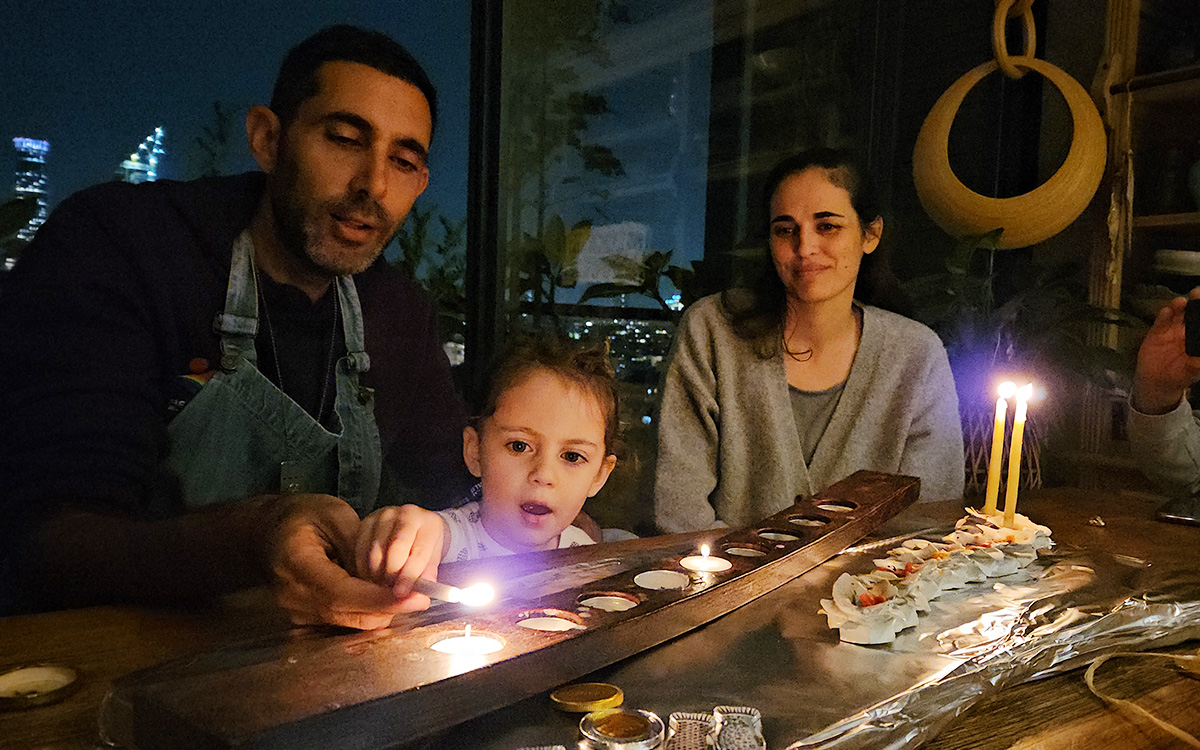
The Israeli government has said Hamas militants killed roughly 1,200 people on Oct. 7, including at least 260 partygoers and others at an all-night music festival in Re’im, a kibbutz that is a few miles southwest of Be’eri. Carmel Gat is among the roughly 130 people who Hamas continues to hold hostage in Gaza.
The Hamas-controlled Gaza Health Ministry says more than 25,000 people have died in the enclave since the war began. Israel after Oct. 7 cut electricity and water to Gaza and stopped most food and fuel shipments.
Hezbollah, which the U.S. and Israel have designated a terrorist organization, has launched rockets from Lebanon into northern Israel.
The Houthis in Yemen have attacked commercial ships in the Red Sea since Oct. 7. The U.S. and the U.K. this month launched air strikes against the Iran-backed rebel group.
Roman told the Blade that many Israelis do not feel safe in their own country.
“We are all feeling so fragile,” he said.
Roman said his sister thinks that “somebody could take me” when she is on the street.
“I told her I feel exactly the same thing … like somebody can take my family and I will not see them for 100 days and I will not see them anymore,” Roman told the Blade.
He also pointed out more than 100,000 people have been displaced from southern and northern Israel since Oct. 7.
“We are under severe attacks from the north as well,” said Roman. “People are displaced. They don’t know when they are going to go back home. They know some of their houses have been attacked, demolished, bombarded.”
Roman noted Israelis who live near the West Bank are also concerned “their towns are going to be infiltrated” by militants who have dug tunnels. He also said there are reports of hostages and Israel Defense Forces soldiers killed “almost every day.” (The IDF on Monday said 24 soldiers were killed in Gaza.)
“We are feeling overwhelmed with fear and anxiety,” said Roman.
The International Court of Justice earlier this month heard legal arguments in South Africa’s case that accuses Israel of committing genocide against Palestinians in Gaza. Israeli Prime Minister Benjamin Netanyahu, meanwhile, is under increased pressure to secure the release of the remaining hostages.
“[It’s] hard to answer,” Roman said in response to the Blade’s question about whether the Israeli government has done enough to secure the hostages’ release.
Roman spoke with the Blade after he and other hostages’ relatives met with Senate Majority Leader Chuck Schumer (D-N.Y.), U.S. Sens. Joni Ernst (R-Iowa) and Ben Cardin (D-Md.) and other lawmakers on Capitol Hill. Roman and his cousin also had a private meeting with U.S. Sens. Bernie Sanders (I-Vt.) and Elizabeth Warren (D-Mass.).
“They were so attentive, so reasonable, so supportive,” said Roman, referring to the meeting with Sanders and Warren.
No ceasefire until all hostages are released
Roman was in D.C. days before A Wider Bridge brought a group of LGBTQ activists from the U.S. to Israel.
Today we visited Kibbutz Kfar Aza with a delegation of #LGBTQ activists from the United States in order to bear witness to the atrocities of October 7. It was a strong reminder for the values we are fighting for, the values that define us in contrast to our enemies, and most… pic.twitter.com/xX14A8JkkC
— Elad Strohmayer 🎗️ (@EladStr) January 23, 2024
The trip coincided with growing calls for a ceasefire in Gaza.
“The genocide in Gaza and violent attacks in Israel and Palestine must end,” said the National LGBTQ Task Force ahead of its annual Creating Change conference that took place last week in New Orleans.
Roman told the Blade he was afraid to walk in public while holding a poster with Gat’s picture on it because people “screamed at me, commented on it” when he was in New York.
“They don’t see me as a person,” said Roman. “I don’t think they see Carmel or Yarden as a person. They don’t see them as people. They see them as what Hamas tried to make them, a tool of war.”
“You have many people who are not on our side, who are justifying the fact that people have been murdered, that people have been raped, slaughtered, taken hostage,” he added.
Roman also said there cannot be a ceasefire until Hamas releases all of the hostages.
“There might be a ceasefire if all the hostages will be released,” he said. “The hostages are key.”
Israel
Iranian missile destroys Tel Aviv’s last gay bar
Mash Central is a few blocks from US Embassy
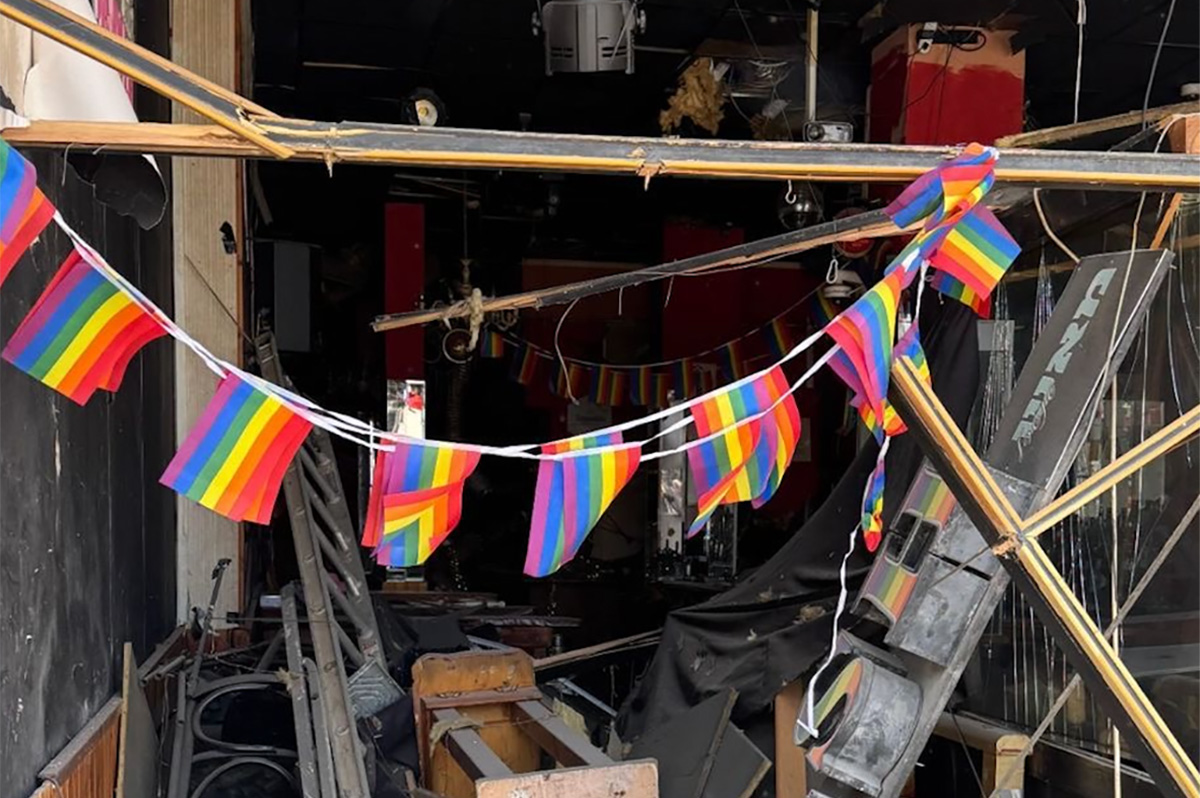
An Iranian missile on June 16 destroyed a gay bar in Tel Aviv, Israel.
The missile struck Mash Central, which is a few blocks from the U.S. Embassy on Allenby Street, and surrounding buildings. Israeli sources confirmed to the Washington Blade that Mash Central was the only gay-specific bar in Tel Aviv.
“Iran’s missile strike yesterday destroyed Tel Aviv’s only dedicated gay bar,” reads one Instagram post with pictures from inside the bar. “This place provided a safe space for minorities to express themselves — now it’s trashed.”
Mash Central describes itself as Tel Aviv’s “last gay bar standing,” even though the city promotes itself as one of the world’s most LGBTQ-friendly cities.
Israel on June 13 launched airstrikes against Iran that targeted the country’s nuclear and military facilities. Iran since the war began has launched hundreds of missiles towards Israel.
Tel Aviv’s Pride parade was scheduled to take place on June 13, but authorities cancelled it. Caitlyn Jenner, who was to have been the event’s guest of honor, is among those who were stranded in Israel after the war began.
Israel
Tel Aviv Pride parade cancelled after Israel attacks Iran
Caitlyn Jenner was to have been guest of honor
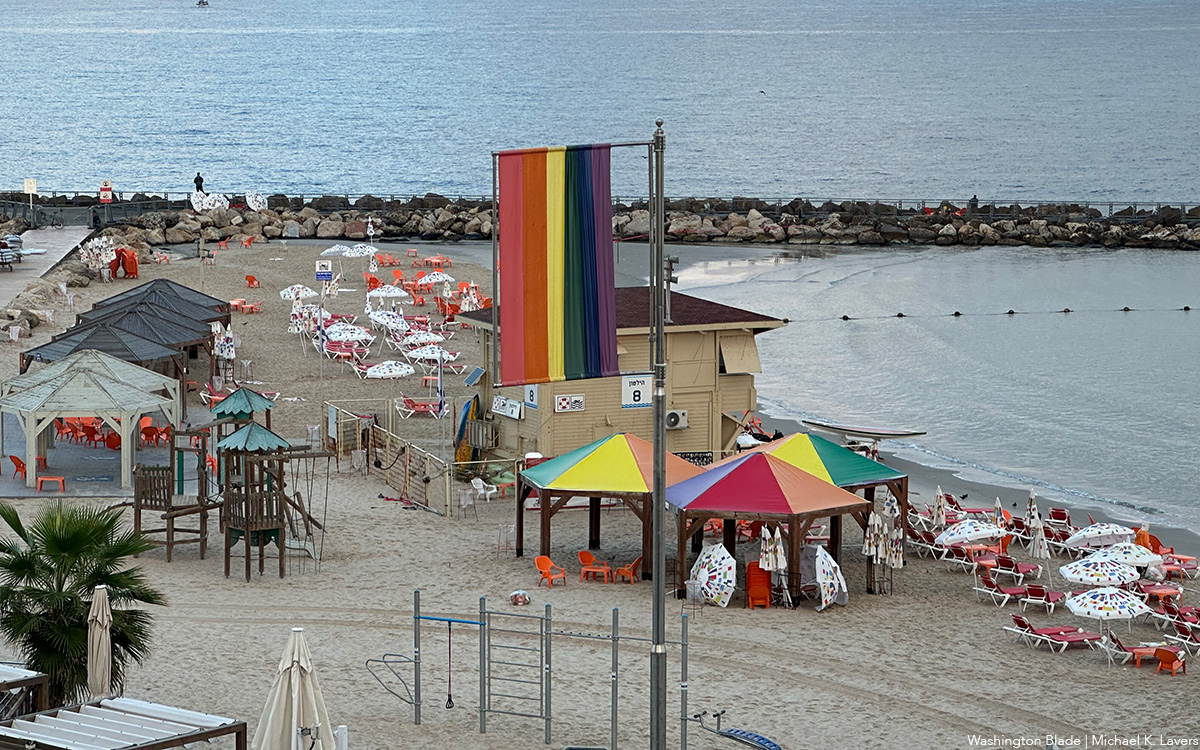
Tel Aviv authorities on Friday cancelled the city’s Pride parade after Israel launched airstrikes against Iran.
The Associated Press notes the Israeli airstrikes targeted nuclear and military facilities in Iran. Reports indicate the airstrikes killed two top nuclear scientists and the leader of Iran’s Revolutionary Guard.
Iran in response to the airstrikes launched more than 100 drones towards Israel. The Israel Defense Forces said it intercepted them.
The Tel Aviv Pride parade had been scheduled to take place on Friday. Caitlyn Jenner was to have been the event’s guest of honor.
Authorities, in consultation with local LGBTQ activists, last year cancelled the Tel Aviv Pride parade out of respect for the hostages who remained in the Gaza Strip after Oct. 7. Jerusalem’s annual Pride parade took place on June 5.
Iran
Underground queer network challenges Iranian regime
Homosexuality remains punishable by death in country

While global powers negotiate with Iran’s regime under Ayatollah Ali Khamenei to curb its advancing nuclear program, the oppressed LGBTQ community is building and operating a secret underground network to resist state-coerced sex reassignment surgeries.
These surgeries, mandated for gay and lesbian people as a state-sanctioned alternative to execution for homosexuality, are part of Iran’s penal code that criminalizes consensual same-sex sexual relations. The network provides safe houses, forged identification documents, and covert communication channels to protect members from government raids and imprisonment.
Precise data on LGBTQ people prosecuted in Iran for resisting state-coerced sex reassignment surgeries over the past decade remains elusive, as the regime’s opaque judicial system obscures such cases under vague charges like “corruption on earth” or “sodomy.” NGOs, including 6Rang, report that thousands of gay and lesbian Iranians face pressure to undergo surgeries to avoid execution for same-sex conduct, with resistance often leading to arrests or harassment for violating gender norms.
Zahra Seddiqi Hamedani and Elham Choubdar, two prominent activists, in 2022 were sentenced to death for their social media advocacy, charged with “corruption” and “human trafficking,” though their convictions were overturned in 2023. Similarly, Rezvaneh Mohammadi in 2019 received a five-year sentence for promoting “homosexual relations,” a charge hinting at resistance to the regime’s heteronormative mandates.
Arsham Parsi in 2003 escalated his clandestine fight for Iran’s LGBTQ community by launching Voice Celebration, a secret Yahoo chat group where 50 queer Iranians, using aliases, exchanged coded messages to evade the regime’s surveillance. Operating like operatives in a shadow network, participants shared text messages about human rights and survival tactics, knowing a single breach could lead to torture or execution. Parsi, then 23, orchestrated the group’s encrypted communications, building a virtual lifeline that connected isolated individuals across the country until his cover was nearly blown, forcing a desperate escape in early 2005.
Parsi in an exchange with the Washington Blade revealed a defiant undercurrent in Iran, a movement too elusive to be called traditional resistance yet pulsing with covert rebellion against the regime.
The state’s relentless push to force gay men into coerced surgeries — marketed as a “solution” to their sexuality — seeks to erase their identities through enforced conformity. Parsi, steering the International Railroad for Queer Refugees, disclosed how queer Iranians fight back with clandestine measures: Underground education to counter state propaganda, discreet psychological support to fortify resilience, and encrypted networks to forge secret alliances. These efforts, veiled to evade regime detection, dismantle the state’s narrative with every hidden signal and guarded connection.
“We are working to create a true grassroots resistance by empowering people to understand their identity, seek safe alternatives, and reclaim their agency despite the oppressive context,” said Parsi. “The Iranian regime’s policies are built on denial of sexual orientation and a forced alignment with a binary gender model.”
“Rather than recognizing gay, lesbian, or bisexual individuals, the system pressures them — particularly gay men — to undergo irreversible surgeries in order to be legally tolerated,” he added. “This systemic violence creates deep psychological harm and compels many to resist, even quietly, to protect their truth. The lack of legal recognition and the threat of arrest, harassment, or blackmail fuels the underground defiance we see today. It’s not only resistance for survival — it’s a rejection of state-imposed identity suppression.”
IRQR, guided by Parsi, for nearly two decades has operated as a lifeline, orchestrating daring escapes and running a covert network for Iran’s hunted queer community.
Parsi said his work relies on secret, encrypted channels — meticulously managed to avoid detection — to funnel at-risk individuals to safety, smuggle life-saving information, secure hidden safe houses, and deliver emotional support. Every operation faces threats not only from the regime’s security forces but also from Basij militia operatives who masquerade as queer individuals to infiltrate networks, heightening the peril for those marked by their identities.
Black-clad Basij militia members respond at the first signs of defiance; tearing through crowds on motorcycles with batons and guns at the ready, poised to crush any challenge to Iran’s regime. These paramilitary volunteers, bound by fierce loyalty to the Islamic Republic, serve as the state’s enforcers, their plainclothes operatives slipping into dissident networks to root out the defiant.
The Basij fill queer Iranians with dread; their so-called morality patrols and digital traps stalking those who dare to exist outside the regime’s rigid norms.
“Their goal is not only to gather intelligence but to undermine, divide, and cancel the work of activists and organizations like ours,” said Parsi. “This divide-and-conquer strategy is designed to break solidarity and generate mistrust.”
“We have seen numerous cases where trusted circles were compromised by these informants, and it has made our work — and survival — even more complex,” he further noted. “Despite this, we persist. Through our underground connections, we have helped thousands of queer Iranians seek safety, community, and ultimately, freedom.”
Parsi told the Blade that international support — through funding, advocacy, policy pressure, or amplifying his stories — can significantly strengthen his work to protect Iran’s persecuted queer community. He emphasized IRQR operates with limited resources, making global solidarity essential to improve outreach, enhance safety measures, and respond swiftly to those in need. Parsi underscored such support brings visibility to the crisis in Iran, reminding those at risk they are not forgotten while exerting pressure on a regime that thrives on silence and fear.
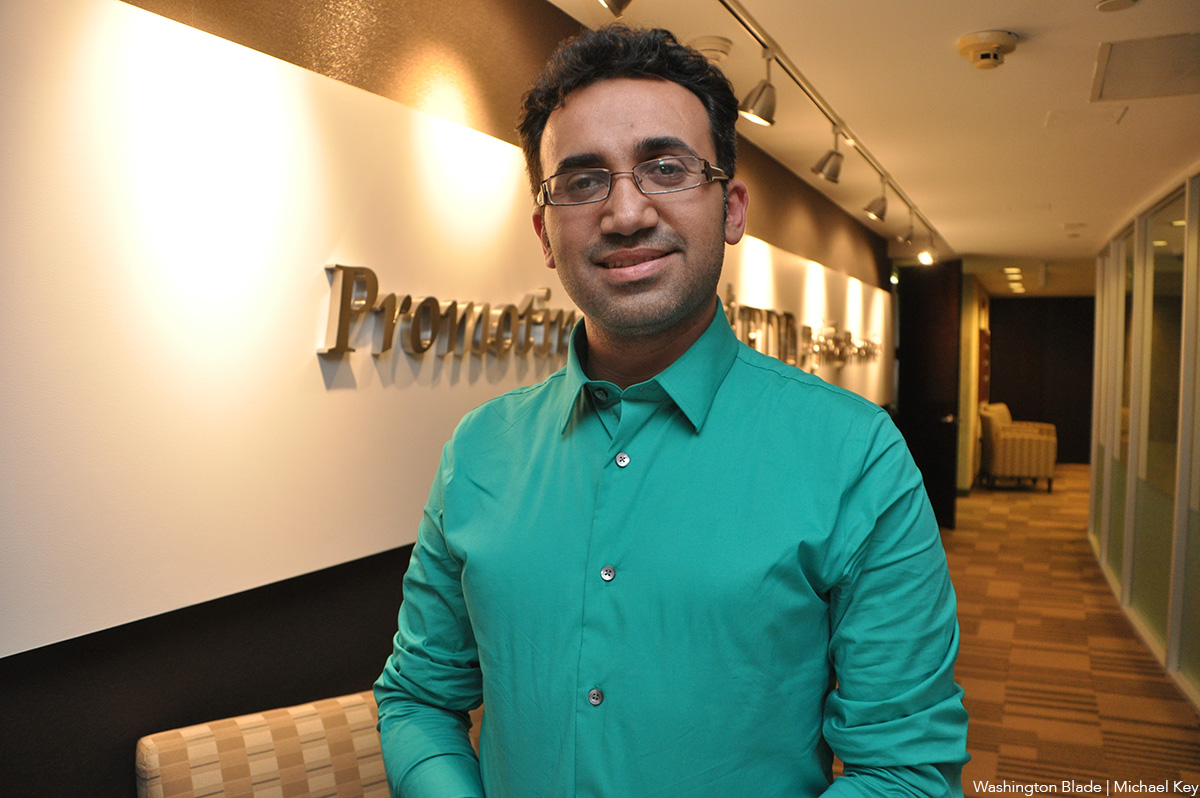
One of the things that Parsi’s underground network offers is online workshops that educate queer Iranians about how they can remain beyond the regime’s reach.
He said these sessions, designed for safety and accessibility, encompass peer support, mental health education, digital security training, and guidance on refugee pathways. Parsi explained the workshops give vulnerable Iranians the tools to navigate persecution, defy state surveillance, and pursue escape, exposing the resilience of a community under relentless scrutiny.
“Due to the high risk of persecution in Iran, traditional protests are not feasible,” said Parsi. “Instead, acts of resistance take quieter forms — like anonymous storytelling which are just as powerful in building awareness and connection within the community. While discreet, these activities help create a sense of solidarity and empowerment among queer Iranians.”
Parsi, undeterred by Iran’s unyielding regime, asserted with measured confidence that while underground acts of defiance — living authentically, supporting one another, resisting forced medicalisation — may not shift policy overnight, they are already improving lives. He stressed these quiet rebellions that queer Iranians stage challenge the regime’s narrative of shame and invisibility, forging a resilient foundation for future change. Each act, Parsi emphasized, dismantles the regime’s grip, offering hope to those navigating a landscape of relentless oppression.
“At IRQR, we view each life saved, each network built, and each truth spoken as a small but powerful act of resistance,” said Parsi. “These are the seeds of future liberation. Over time, as they multiply and gain visibility — locally and internationally — they will help reshape the landscape for queer Iranians.”
ILGA Asia Executive Director Henry Koh said queer Iranians’ underground resistance is a powerful assertion of bodily autonomy and self-determination. He described it as a deeply courageous act in a regime where visibility invites immense personal risk, from arrest to execution.
When asked by the Blade if the Iranian regime’s punitive measures against openly queer people fuel underground resistance, Koh responded unequivocally.
“Absolutely,” he said. “The climate of criminalization and repression leaves little safe space for queer people to live openly. This forces many into secrecy or underground networks as a means of survival, resistance, and mutual support. Such conditions are not only unjust but also profoundly harmful to the well-being of LGBTIQ+ individuals.”
“It is important to distinguish between affirming gender-affirming care and any form of coercive medical intervention,” he added. “When states or authorities mandate medical procedures as a condition for recognition or safety, it constitutes a grave violation of human rights. Gender identity is deeply personal, and no institution should override an individual’s self-defined identity.”
-

 U.S. Supreme Court12 hours ago
U.S. Supreme Court12 hours agoSupreme Court upholds ACA rule that makes PrEP, other preventative care free
-

 U.S. Supreme Court13 hours ago
U.S. Supreme Court13 hours agoSupreme Court rules parents must have option to opt children out of LGBTQ-specific lessons
-

 National2 days ago
National2 days agoEvan Wolfson on the 10-year legacy of marriage equality
-

 District of Columbia3 days ago
District of Columbia3 days agoActivists fight to protect LGBTQ services in D.C. budget

